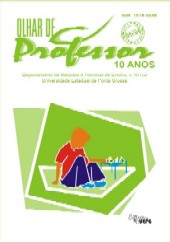LA FORMACIÓN DOCENTE EN LA SOCIEDAD DEL CONOCIMIENTO Y LA INFORMACIÓN: AVANCES Y TEMAS PENDIENTES
Main Article Content
Abstract
Nuestras sociedades están envueltas en un complicado proceso de transformación. Uma transformación no planificada que está afectando a la forma como nos organizamos, como trabajamos, cómo nos relacionamos, y cómo aprendemos. Estos cambios tienen un reflejo visible en la escuela como institución encargada de formar a los nuevos ciudadanos. ¿Em qué afectan estos cambios a los profesores? ¿Cómo debemos repensar el trabajo del profesor en estas nuevas circunstancias? ¿Cómo deberían formarse los nuevos profesores? ¿Cómo adecuamos los conocimientos y las actitudes del profesorado para dar respuesta y aprovechar las nuevas oportunidades que la sociedad de la información nos ofrece? En este artículo revisamos algunos avances y temas pendientes que la formación tiene para enfrentarse con eficiencia a las necesidades de la sociedad del conocimiento: universidad y escuela: la laguna de los dos mundos; formadores de profesores universitarios y profesores supervisores de aula; conocimiento disciplinar y conocimiento pedagógico; teoria y práctica: desvalorización de la teoría y adoración de la práctica; tradición e innovación; homogeneidad y diversidad: profesores homogéneos para un alumnado diverso; enseñanza y aprendizaje; formación inicial y formación continua; aprendizaje formal y informal; aislamiento en el aula y la sociedad en red.
Downloads
Article Details
Authors who publish in this journal agree with the following terms:
a) Authors keep the copyrights and concede the right of its first publication to the magazine. The work piece must be simultaneously licensed on the Creative Commons Attribution License which allows the paper sharing, and preserves both the author identity and the right of first publication to this magazine.
b) Authors are authorized to assume additional contracts separately, to not-exclusively distribution of the paper version published in this magazine (e.g.: publish in institutional repository or as a book chapter), with the author identity recognition and its first publication in this magazine.
c) Authors are permitted and stimulated to publish and distribute their papers online (e.g.: in institutional repository or on their personal webpage), considering it can generate productive alterations, as well as increase the impact and the quotations of the published paper.
d) This journal provides public access to all its content, as this allows a greater visibility and reach of published articles and reviews. For more information on this approach, visit the Public Knowledge Project, a project that developed this system to improve the academic and public quality of the research, distributing OJS as well as other software to support the publication system of public access to academic sources.
e) The names and e-mail addresses on this site will be used exclusively for the purposes of the journal and are not available for other purposes.

This work is licensed under a Creative Commons Attribution 4.0 International License.

